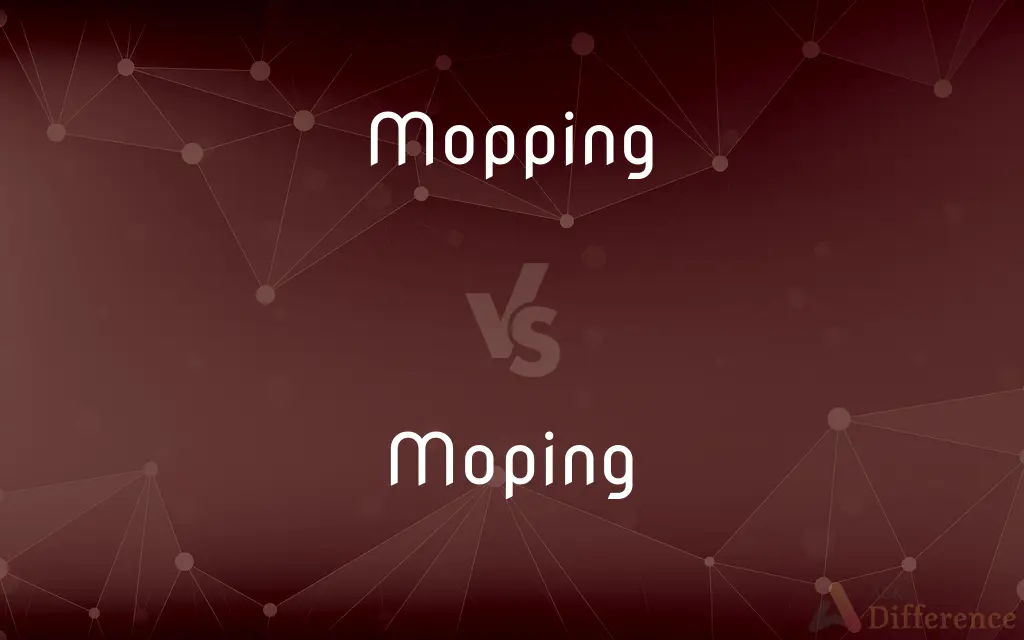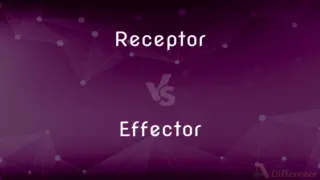Mopping vs. Moping — What's the Difference?
By Maham Liaqat & Urooj Arif — Updated on March 4, 2024
Mopping involves cleaning floors with a wet mop; moping is showing dejection or being idle. Both involve action but in vastly different contexts.

Difference Between Mopping and Moping
Table of Contents
ADVERTISEMENT
Key Differences
Mopping is a physical activity focused on cleanliness, involving the use of a mop and water to clean floors. It is a routine task in household and commercial cleaning, aiming to remove dirt, spills, and stains from surfaces. Whereas moping refers to a state of being, characterized by sadness, dejection, or idleness. While mopping requires physical effort and movement, moping involves little to no physical activity, often resulting in a person being stationary or aimless.
Mopping is considered a productive and necessary chore that contributes to the maintenance of hygiene and cleanliness in living or working spaces. On the other hand, moping is generally viewed as an unproductive behavior, marked by brooding or listlessness, often a response to emotional distress or disappointment.
The tools and materials used in mopping are tangible, such as a mop, bucket, and cleaning solutions. Moping, however, does not involve any physical tools or materials but is an emotional state that affects one's mood and behavior. Mopping results in a visible change in the environment, making spaces cleaner and more pleasant. Whereas the effects of moping are internal, impacting the individual's mental and emotional well-being.
Mopping can be a solitary or collaborative activity, often shared among household members or coworkers in a professional setting to distribute the workload. Moping, in contrast, is a highly personal experience. Though it may be shared or expressed among friends or family, it is primarily an individual's internal coping mechanism to sadness or stress.
The motivation behind mopping is usually clear and practical, aiming to achieve a specific level of cleanliness and order. The reasons for moping can be varied and complex, often rooted in personal emotions, thoughts, or circumstances that lead to feelings of despondency or apathy.
ADVERTISEMENT
Comparison Chart
Activity Type
Physical cleaning
Emotional state
Purpose
To clean and sanitize floors
To express sadness or idleness
Tools Required
Mop, bucket, water, cleaning solution
None
Result
Clean and hygienic surfaces
Emotional release or stagnation
Social Aspect
Can be individual or shared
Primarily individual, though can be expressed
Compare with Definitions
Mopping
Using a mop to clean or absorb liquid from a floor.
She spent the morning mopping the kitchen floor after the spill.
Moping
To be sullenly idle or indulge in self-pity.
She was moping around the house all day after receiving the bad news.
Mopping
The process of using a mop to apply or remove cleaning solutions.
Mopping up the spilled water helped prevent slipping.
Moping
The act of showing despondency or lack of enthusiasm.
Moping won't solve any problems; it's better to look for solutions.
Mopping
The act of wiping a surface with a wet mop for cleanliness.
Mopping the hallway took longer than expected due to the mud tracks.
Moping
Exhibiting a gloomy or dejected mood.
He's been moping since they lost the game.
Mopping
Physical activity directed towards maintaining hygiene in indoor spaces.
Regular mopping is essential for keeping the floors sparkling.
Moping
Behavior characterized by sadness or lethargy.
After the breakup, she spent weeks moping and watching old movies.
Mopping
A household implement made of absorbent material attached to a typically long handle and used for washing, dusting, or drying floors.
Moping
A state of being listless or unproductive due to emotional reasons.
Moping in bed all day won't make you feel any better.
Mopping
A method of cleaning that involves water and a cleaning agent.
He prefers mopping with vinegar for an eco-friendly clean.
Moping
To think gloomily and persistently about something; be dejected.
Mopping
To wash or wipe with or as if with a mop
Mopped the hallway.
Mopping the spilled water.
Mopped her forehead with a towel.
Moping
To move in a listless or aimless manner, especially from being sad or depressed
Moped about the house all summer.
Mopping
To use a mop to wash or dry surfaces
Mopped along the baseboards.
Moping
The act of one who mopes.
Mopping
The process of cleaning with a mop.
Mopping
Cleaning with a mop;
He gave it a good mopping
Common Curiosities
Can moping be helpful?
Occasionally, moping can be a way to process emotions, but prolonged moping is generally unhelpful.
Why do people mop?
People mop to maintain cleanliness, hygiene, and appearance of their floors.
Is mopping a daily task?
The frequency of mopping depends on foot traffic and the need for cleanliness; it's not necessarily daily.
How can one stop moping?
Engaging in activities, seeking support, or finding new interests can help shift away from moping.
What triggers moping?
Emotional distress, disappointments, or personal setbacks can trigger moping.
Do mopping and moping require special skills?
Mopping requires basic physical effort and technique, whereas moping is not about skill but an emotional state.
How does one deal with someone who is moping?
Offering support, listening, and encouraging positive activities can be helpful.
What does mopping achieve?
Mopping cleans and sanitizes floors, removing dirt and bacteria.
Can moping affect relationships?
Yes, prolonged moping can strain relationships if it leads to withdrawal or neglect of shared responsibilities.
Is there a right way to mop?
Effective mopping involves using the right cleaners, a clean mop, and sometimes specific techniques for different floors.
Can mopping be considered exercise?
It can be light physical activity, contributing to overall daily movement.
Is mopping environmentally friendly?
It can be, especially when using eco-friendly cleaners and methods.
Does moping have any physical effects?
Indirectly, as prolonged inactivity or listlessness can impact physical health.
What materials are needed for mopping?
A mop, bucket, water, and cleaning solutions are essential for mopping.
Can moping lead to depression?
While moping is a temporary state, if persistent, it may indicate or lead to deeper issues like depression.
Share Your Discovery

Previous Comparison
Receptor vs. Effector
Next Comparison
Gauntlet vs. GreavesAuthor Spotlight
Written by
Maham LiaqatCo-written by
Urooj ArifUrooj is a skilled content writer at Ask Difference, known for her exceptional ability to simplify complex topics into engaging and informative content. With a passion for research and a flair for clear, concise writing, she consistently delivers articles that resonate with our diverse audience.














































